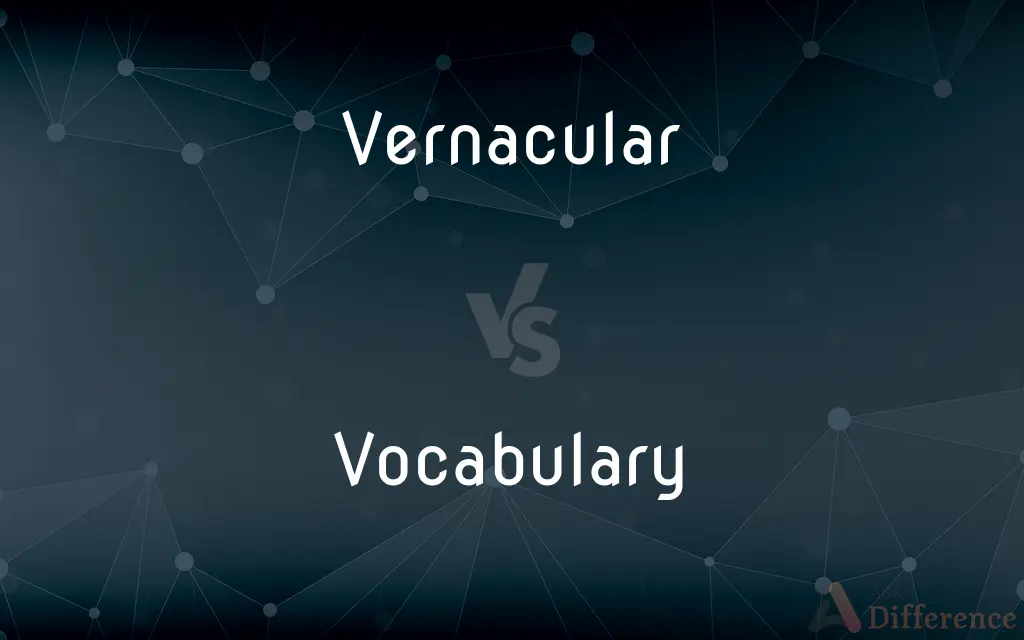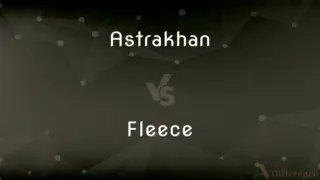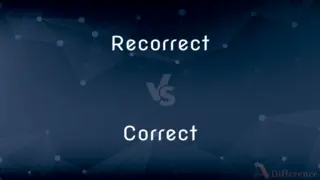Vernacular vs. Vocabulary — What's the Difference?
By Tayyaba Rehman — Updated on September 24, 2023
Vernacular" refers to the native language or dialect of a specific population, while "Vocabulary" means the set of words known to an individual or the words of a particular language. Both relate to language but focus on different aspects.

Difference Between Vernacular and Vocabulary
Table of Contents
ADVERTISEMENT
Key Differences
Vernacular" and "Vocabulary" are terms deeply rooted in the realm of linguistics but serve distinct purposes. "Vernacular" is the language or dialect spoken by the ordinary people of a particular region or country. It's the everyday speech of the people, as opposed to literary or learned languages. In contrast, "Vocabulary" pertains to the collection or set of words that an individual knows or that make up a specific language.
When considering the broader scope of language, "Vernacular" emphasizes the colloquial and regional elements. It brings to the forefront the nuances, slang, and idiomatic expressions unique to a community. On the flip side, "Vocabulary" is the backbone of any language or dialect, vernacular included. It's the repository of words and terms available for use.
Furthermore, "Vernacular" can also indicate the plain, everyday language as opposed to jargon or technical language. For example, legal vernacular differs from complex legal terminologies. Meanwhile, "Vocabulary" can extend beyond the realm of everyday communication, encompassing specialized words from various fields like science, arts, or business.
Lastly, it's crucial to note that while "Vernacular" is about how language is organically used by a community, "Vocabulary" is about the individual or collective arsenal of words available within that language or to a person.
Comparison Chart
Primary Meaning
The native language or dialect of a specific group.
Set of words known to an individual or within a language.
ADVERTISEMENT
Scope
Regional or community-based language.
Can be individual or collective, general or specialized.
Relation to Language
A type or form of language.
Constituent parts of a language.
Usage
Everyday speech of a community.
Words used in speech or writing.
Variation
Can differ from official or standardized languages.
Expands with learning and experience.
Compare with Definitions
Vernacular
The everyday language spoken by a population.
The vernacular of New Orleans is rich and varied.
Vocabulary
A list of words with definitions, as in a dictionary.
The vocabulary at the book's end helps with tough terms.
Vernacular
Plain language not filled with jargon.
He prefers the vernacular when explaining complex topics.
Vocabulary
Words known or used by an individual.
Her vocabulary is impressive for her age.
Vernacular
Architectural or artistic style native to a region.
The buildings showcased vernacular architecture.
Vocabulary
The body of words used in a language.
English has a vast vocabulary.
Vernacular
A vernacular or vernacular language refers to the language or dialect that is spoken by people that are inhabiting a particular country or region. The vernacular is typically the native language, normally spoken informally rather than written, and seen as of lower status than more codified forms.
Vocabulary
Words or phrases of a specific subject.
Musical vocabulary includes terms like allegro and forte.
Vernacular
The language or dialect spoken by the ordinary people in a particular country or region
He wrote in the vernacular to reach a larger audience
Vocabulary
A range or system of symbols, expressions, or gestures.
Art has its own vocabulary of colors and shapes.
Vernacular
Architecture concerned with domestic and functional rather than public or monumental buildings
Buildings in which Gothic merged into farmhouse vernacular
Vocabulary
A vocabulary is a set of familiar words within a person's language. A vocabulary, usually developed with age, serves as a useful and fundamental tool for communication and acquiring knowledge.
Vernacular
(of language) spoken as one's mother tongue; not learned or imposed as a second language.
Vocabulary
All the words of a language.
Vernacular
(of architecture) concerned with domestic and functional rather than public or monumental buildings
Vernacular buildings
Vocabulary
The sum of words used by, understood by, or at the command of a particular person or group.
Vernacular
The everyday language spoken by a people as distinguished from the literary language.
Vocabulary
A list of words and often phrases, usually arranged alphabetically and defined or translated; a lexicon or glossary.
Vernacular
A variety of such everyday language specific to a social group or region
The vernaculars of New York City.
Vocabulary
A supply of expressive means; a repertoire of communication
A dancer's vocabulary of movement.
Vernacular
The specialized vocabulary of a particular trade, profession, or group
In the legal vernacular.
Vocabulary
A usually alphabetized and explained collection of words e.g. of a particular field, or prepared for a specific purpose, often for learning.
Vernacular
The common, nonscientific name of a plant or animal.
Vocabulary
The collection of words a person knows and uses.
My Russian vocabulary is very limited.
Vernacular
Native to or commonly spoken by the members of a particular country or region.
Vocabulary
The stock of words used in a particular field.
The vocabulary of social sciences is often incomprehensible to ordinary people.
Vernacular
Using the native language of a region, especially as distinct from the literary language
A vernacular poet.
Vocabulary
The words of a language collectively; lexis.
The vocabulary of any language is influenced by contacts with other cultures.
Vernacular
Relating to or expressed in the native language or dialect.
Vocabulary
(by extension) A range of artistic or stylistic forms or techniques.
Vernacular
Of or being an indigenous building style using local materials and traditional methods of construction and ornament, especially as distinguished from academic or historical architectural styles.
Vocabulary
A list or collection of words arranged in alphabetical order and explained; a dictionary or lexicon, either of a whole language, a single work or author, a branch of science, or the like; a word-book.
Vernacular
Occurring or existing in a particular locality; endemic
A vernacular disease.
Vocabulary
A listing of the words used in some enterprise
Vernacular
Relating to or designating the common, nonscientific name of a biological species.
Vocabulary
A language user's knowledge of words
Vernacular
The language of a people or a national language.
A vernacular of the United States is English.
Vocabulary
The system of techniques or symbols serving as a means of expression (as in arts or crafts);
He introduced a wide vocabulary of techniques
Vernacular
Everyday speech or dialect, including colloquialisms, as opposed to standard, literary, liturgical, or scientific idiom.
Street vernacular can be quite different from what is heard elsewhere.
Vernacular
Language unique to a particular group of people.
For those of a certain age, hiphop vernacular might just as well be a foreign language.
Vernacular
A language lacking standardization or a written form.
Vernacular
Indigenous spoken language, as distinct from a literary or liturgical language such as Ecclesiastical Latin.
Vatican II allowed the celebration of the mass in the vernacular.
Vernacular
(architecture) A style of architecture involving local building materials and styles, not imported.
Vernacular
Of or pertaining to everyday language, as opposed to standard, literary, liturgical, or scientific idiom.
Vernacular
Belonging to the country of one's birth; one's own by birth or nature.
A vernacular disease
Vernacular
(architecture) Of or related to local building materials and styles; not imported.
Vernacular
(art) Connected to a collective memory; not imported.
Vernacular
Belonging to the country of one's birth; one's own by birth or nature; native; indigenous; - now used chiefly of language; as, English is our vernacular language.
His skill in the vernacular dialect of the Celtic tongue.
Which in our vernacular idiom may be thus interpreted.
Vernacular
The vernacular language; one's mother tongue; often, the common forms of expression in a particular locality, opposed to literary or learned forms.
Vernacular
A characteristic language of a particular group (as among thieves);
They don't speak our lingo
Vernacular
The everyday speech of the people (as distinguished from literary language)
Vernacular
Being or characteristic of or appropriate to everyday language;
Common parlance
A vernacular term
Vernacular speakers
The vulgar tongue of the masses
The technical and vulgar names for an animal species
Vernacular
A nonstandard language or dialect of a locality.
Tourists often find the local vernacular challenging.
Vernacular
The mode of expression of a particular group.
The digital age has its own vernacular.
Common Curiosities
Is "Vocabulary" limited to spoken words?
No, it includes all words, whether spoken, written, or read.
Can "Vernacular" be used in architecture?
Yes, it can refer to regional or native architectural styles.
Can one's "Vocabulary" grow over time?
Absolutely, with reading, learning, and experiences.
Can "Vocabulary" include technical terms?
Yes, there can be specialized vocabularies in various fields.
Can "Vernacular" include slang?
Yes, slang is often part of the vernacular of a group.
Does "Vernacular" always refer to regional dialects?
Often, but it can also mean everyday language of any group.
Does "Vocabulary" only pertain to language?
Mainly, but it can also refer to symbols or gestures in other contexts.
Is "Vernacular" speech different from formal speech?
Typically, yes. Vernacular is more colloquial and informal.
Is a dictionary a representation of a language's "Vocabulary"?
Partially, a dictionary contains many words, but language is always evolving.
Is "Vernacular" the opposite of standardized language?
It can be, especially if it contrasts with an official language.
Share Your Discovery

Previous Comparison
Astrakhan vs. Fleece
Next Comparison
Recorrect vs. CorrectAuthor Spotlight
Written by
Tayyaba RehmanTayyaba Rehman is a distinguished writer, currently serving as a primary contributor to askdifference.com. As a researcher in semantics and etymology, Tayyaba's passion for the complexity of languages and their distinctions has found a perfect home on the platform. Tayyaba delves into the intricacies of language, distinguishing between commonly confused words and phrases, thereby providing clarity for readers worldwide.















































